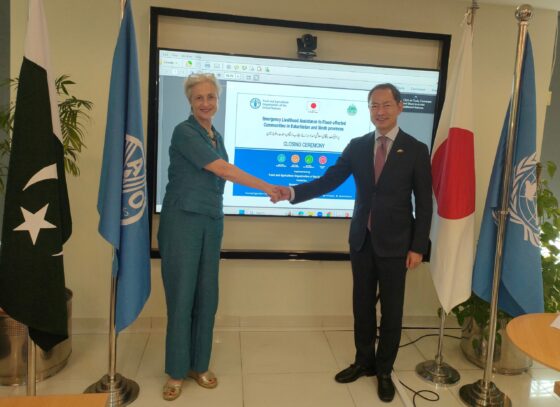ISLAMABAD -UNS: The Food and Agriculture Organization of the United Nations (FAO) has concluded a critical emergency project that provided support to flood-affected farming and herding communities in
Pakistan’s Balochistan and Sindh provinces, made possible through generous funding from the
Government of Japan.
The FAO-led intervention, backed by a contribution of USD 6.48 million, focused on restoring food
production, improving household nutrition, and building longer-term resilience in areas devastated by
the unprecedented 2022 floods. Over 74,000 households—equivalent to more than 520,000
people—benefited from the initiative, which combined agricultural support with livestock protection
and targeted assistance for female-headed families.
A project completion event was held at FAO premises in Islamabad on July 14 to highlight the key results
and express appreciation for Japan’s contribution. The event brought together Ambassador of Japan to
Pakistan, H.E. Mr. Akamatsu Shuichi, FAO Representative in Pakistan, Florence Rolle, and senior
representatives from national and provincial partners.
“The Government of Japan has always prioritized human security in its development cooperation,” said
Ambassador Akamatsu, adding, “This project reflects our commitment to helping the people of Pakistan
recover from the devastating floods and rebuild their lives through practical and sustainable agricultural
support.”
FAO’s response involved the distribution of seeds, fertilizers, and training to help families restart food
production. Over 14,000 households received inputs for vegetable and field crop cultivation, while 1,500
hectares of agricultural land were rehabilitated. As a result, farming families were able to grow a wide
range of crops, including wheat, rice, maize, okra, brinjal, and tomatoes—improving food availability and
income opportunities.
Support to livestock-owning families included the distribution of animal feed, mineral blocks, poultry,
and small ruminants, along with the construction of animal shelters and a mass vaccination campaign
that reached more than 629,000 animals, benefiting 35,000 households. Special focus was given to
female-headed households, who received livestock and poultry packages along with training in animal
care and poultry production to help diversify and stabilize their incomes.
“This project made a real difference in the lives of rural communities that lost nearly everything to the
floods,” said Florence Rolle, FAO Representative in Pakistan. “With Japan’s timely support, families not
only regained their ability to produce food but also strengthened their resilience against future shocks.”
Implemented in close coordination with the Ministry of National Food Security and Research, disaster
management authorities, and non-governmental partners, the project also helped enhance local
knowledge of climate-smart practices, food security planning, and livestock management—laying the
foundation for more resilient rural systems in the future.
Japan-funded FAO project helps restore farming and livestock livelihoods in flood-hit area
2




